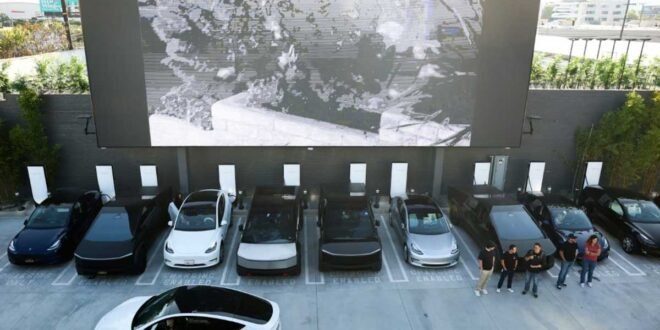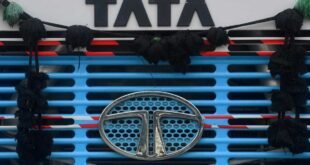Tesla Faces Challenges in a Competitive Electric Vehicle Market
Tesla, the leading electric vehicle (EV) manufacturer, has reported another decline in quarterly profits, reflecting the growing challenges it faces in a rapidly evolving market. The company’s second-quarter profits dropped to $1.2 billion, marking a 16% decrease compared to the same period last year. This decline comes amid increased competition in the EV sector and ongoing scrutiny of CEO Elon Musk’s involvement in U.S. politics.
Revenues for the quarter also fell by 12%, reaching $22.5 billion. Tesla attributed this drop to several factors, including lower auto sales, a reduction in average vehicle selling prices, and higher operating expenses driven by its investments in artificial intelligence (AI) and other research and development projects. The company had previously announced a decline in auto deliveries, which contributed to the lower-than-expected profits.
Despite these challenges, Tesla emphasized its commitment to innovation, particularly in the fields of AI and robotics. The company highlighted its ongoing efforts to maintain a leadership position in these areas, with a focus on developing advanced technologies that could drive future growth.
New Developments and Strategic Moves
Tesla recently launched a robotaxi service in Austin, Texas, marking Musk’s first fully autonomous offering after multiple delays. This initiative is part of the company’s broader strategy to leverage AI and automation in its products. Musk has been vocal about the potential of Tesla’s autonomous driving program and the company’s “Optimus” humanoid robot, which uses AI technology.
However, analysts have raised concerns about Tesla’s pace of innovation and its ability to meet long-term goals. Some critics argue that the company has been slow to introduce new models, raising questions about Musk’s commitment to an earlier target of launching a high-performance electric vehicle priced around $25,000. Such a model would be essential for achieving mass deployment and expanding Tesla’s market share.
In its latest press release, Tesla stated that it is working on a more affordable model, with initial production expected in June and full-scale manufacturing planned for the second half of 2025. The company has also revamped its Model Y, which currently starts at $37,490. However, the price is expected to rise once a $7,500 federal tax credit expires following the passage of President Donald Trump’s recent fiscal package.
Analysts’ Perspectives and Political Controversies
The weakening near-term outlook for EV sales has led some analysts to question Tesla’s stock performance. JPMorgan Chase analysts have described the stock as “completely divorced from increasingly deteriorating fundamentals.” On the other hand, Morgan Stanley has maintained a positive stance, rating Tesla as a “top pick” due to its leadership in robotics and AI. However, a recent note from the firm warned that Musk’s political activities could add further pressure to the company’s stock.
Musk’s involvement in U.S. politics has sparked significant controversy. His financial support for Trump’s 2024 presidential campaign and subsequent role in the administration’s “Department of Government Efficiency” led to public backlash and damage to the Tesla brand. After a falling out with Trump, Musk criticized the president’s legislation and announced the formation of a new political party, the “America Party.”
Trump responded by dismissing the initiative as “ridiculous” and threatening to take action against Musk, including potential deportation and revocation of government contracts. These political tensions have added to the uncertainty surrounding Tesla’s future.
Market Reaction
Following the release of its quarterly results, Tesla’s shares dipped by 0.4% in after-hours trading. The company’s performance reflects the complex interplay of market forces, technological innovation, and political dynamics that continue to shape its trajectory. As Tesla navigates these challenges, its ability to adapt and innovate will be crucial in maintaining its position as a leader in the electric vehicle industry.
 Info Malang Raya Its All About World News
Info Malang Raya Its All About World News



